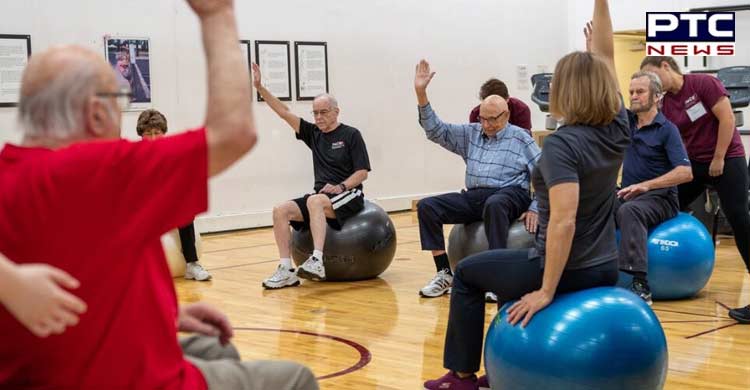Exercise may reduce depression, boost effects of therapy, says study
Washington, April 3: Exercising for half an hour may reduce symptoms of depression for at least 75 minutes post-workout and increase the benefits of therapy, according to a new study led published in the journal, 'Frontiers In Psychiatry'.
 The researchers at the Iowa State University, say "A lot of previous research on the effects of exercise on mental health, in general, have used very broad measures of wellbeing. What we were interested in, specifically, is: how does acute exercise -- that is, one session of exercise in a day -- influence the primary symptoms of depression."
For the first study, the researchers sought the help of 30 adults who were going through major depressive episodes. Participants completed electronic surveys before, halfway through, and after a 30-minute session of either moderate-intensity cycling or sitting, as well as 25-, 50-, and 75-minutes following the workout.
The researchers at the Iowa State University, say "A lot of previous research on the effects of exercise on mental health, in general, have used very broad measures of wellbeing. What we were interested in, specifically, is: how does acute exercise -- that is, one session of exercise in a day -- influence the primary symptoms of depression."
For the first study, the researchers sought the help of 30 adults who were going through major depressive episodes. Participants completed electronic surveys before, halfway through, and after a 30-minute session of either moderate-intensity cycling or sitting, as well as 25-, 50-, and 75-minutes following the workout.
 Those who cycled during the initial lab visit returned a week later to repeat the exercise with 30-minutes of sitting, and vice versa.
Each survey contained standard questions and measures used to assess depression symptoms, as well as numerous cognitive tasks, including the Stroop test; participants responded to the colour of a certain font rather than the word itself (e.g., indicating red when they saw the word 'blue' in red ink).
Also Read | Violence expected in Islamabad as PM Imran Khan faces no-trust vote
The researchers next used the survey data to track any changes in three key depressive disorder characteristics: depressed mood state (e.g., sad, discouraged, gloomy), anhedonia (i.e., difficulties experiencing pleasure from previously enjoyed activities), and decreased cognitive function (e.g., difficulty thinking, juggling multiple pieces of information at once).
Those who cycled during the initial lab visit returned a week later to repeat the exercise with 30-minutes of sitting, and vice versa.
Each survey contained standard questions and measures used to assess depression symptoms, as well as numerous cognitive tasks, including the Stroop test; participants responded to the colour of a certain font rather than the word itself (e.g., indicating red when they saw the word 'blue' in red ink).
Also Read | Violence expected in Islamabad as PM Imran Khan faces no-trust vote
The researchers next used the survey data to track any changes in three key depressive disorder characteristics: depressed mood state (e.g., sad, discouraged, gloomy), anhedonia (i.e., difficulties experiencing pleasure from previously enjoyed activities), and decreased cognitive function (e.g., difficulty thinking, juggling multiple pieces of information at once).
 During the cycling trial, participants' depressed mood improved over 30 minutes and continued to improve for up to 75 minutes afterwards. The improvement in anhedonia starts to decline 75 minutes after exercise, although it was still better than the participants' levels of anhedonia in the comparison group.
In terms of cognitive function, those who cycled were faster on the Stroop test mid-exercise but slower 25- and 50-minutes post-exercise when compared to the resting group.
"The cool thing is these benefits to depressed mood state and anhedonia could last beyond 75 minutes. We would need to do a longer study to determine when they start to wane, but the results suggest a window of time post-exercise when it may be easier or more effective for someone with depression to do something psychologically or cognitively demanding," he said.
During the cycling trial, participants' depressed mood improved over 30 minutes and continued to improve for up to 75 minutes afterwards. The improvement in anhedonia starts to decline 75 minutes after exercise, although it was still better than the participants' levels of anhedonia in the comparison group.
In terms of cognitive function, those who cycled were faster on the Stroop test mid-exercise but slower 25- and 50-minutes post-exercise when compared to the resting group.
"The cool thing is these benefits to depressed mood state and anhedonia could last beyond 75 minutes. We would need to do a longer study to determine when they start to wane, but the results suggest a window of time post-exercise when it may be easier or more effective for someone with depression to do something psychologically or cognitively demanding," he said.
 Also Read | Sri Lanka imposes nationwide social media blackout ahead of protest
-PTC News
Also Read | Sri Lanka imposes nationwide social media blackout ahead of protest
-PTC News